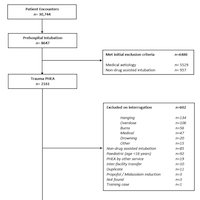Why Are We Still Talking about ICP and Ketamine?
journals.lww.com
A trauma patient required emergent intubation during a recent shift. The altered patient was suspected of having an intracranial bleed. My resident was concerned about rapid onset of hypoxia and other internal injuries causing hemorrhage, as well as post-intubation hypotension, so ketamine was used as the induction agent.
The intubation was uneventful, but interestingly, a nurse anesthetist who took the patient to the operating room was concerned about increased intracranial injury (ICP) from ketamine use. I politely dismissed the claim, but was fascinated when reviewing the literature further to find this is still being debated.
Controversy seems to persist whether ketamine raises intracranial pressure in patients with traumatic brain injury (TBI). Sadly, this is yet another dogmatic principle requiring dismissal. Patients with moderate to severe TBI often require airway management in the ED to avoid hypoxia and further neurologic insult.
Ketamine is a popular choice in the ED for intubating those critically ill due to its preferred hemodynamic profile.
















